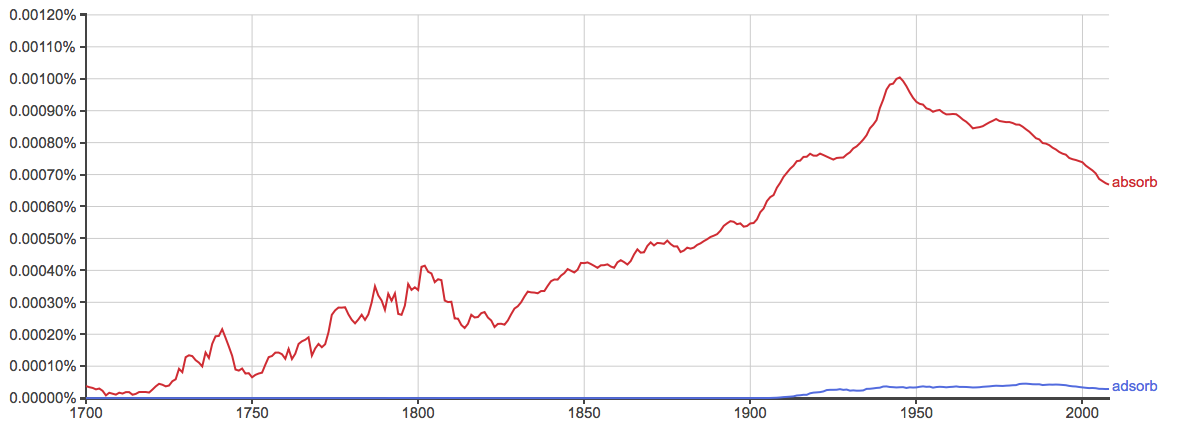If you spill tomato sauce on your brand new shirt, would you try to absorb the sauce, or adsorb it? Either way, unless you treat it immediately, your shirt is likely ruined.
The verbs adsorb and absorb are near homophones, and their meanings both involve collecting a substance, but they actually mean different things. They cannot be substituted for each other in any contexts.
If you are a scientist working with volatile substances in a laboratory environment, you will need to know the difference between these confusing words. You will also need to know the difference next time you spill something on your clothes, so read on for an explanation.
What is the Difference Between Adsorb and Absorb?
In this post, I will compare adsorb vs. absorb, and use each word in an example sentence. I will also show you how to use a mnemonic device that makes choosing adsorb or absorb a little easier.
When to Use Adsorb
 What does adsorb mean? Adsorb is a verb. It means to collect condensed gas from a surface.
What does adsorb mean? Adsorb is a verb. It means to collect condensed gas from a surface.
Adsorb is a scientific term, and it is only rarely used outside of scientific contexts.
Here are a few examples of adsorb in a sentence,
- Healy adsorbed the noxious vapor on a microscope slide and examined it.
- In order to better adsorb the gasses, the lab techs closed all the windows and sealed the vents.
- According to Ke, the compound could be used in a manner similar to applying salt to contaminated water. Since it is lighter than water, the material floats to adsorb iodine and then sinks as it becomes heavier. –Science Daily
According to Merriam-Webster, adsorb has only been in use since 1809, when it was invented by combining the prefix ad- with the verb absorb.
Derivative words of adsorb are,
When to Use Absorb
 What does absorb mean? Absorb, the more common and older of the two words, is also a verb. Absorb means to soak up, like a person would soak up water with a towel when drying dishes.
What does absorb mean? Absorb, the more common and older of the two words, is also a verb. Absorb means to soak up, like a person would soak up water with a towel when drying dishes.
Absorb becomes absorbent as an adjective. Many things are absorbent, like clothes, sponges, moss, and carpets.
For example,
- If you spill red wine on a carpet, absorb as much liquid as possible with a clean rag, then soak the stain in a mixture of vinegar and dish detergent before blotting with another clean rag.
- The global conglomerate will absorb the tech startup into its own structure, retaining most of the current engineers and designers.
- S. exporters absorb some of the financial toll of inefficient transport, with farmers on the Upper Mississippi or Illinois rivers receiving up to 21 cents less per bushel of corn in the event of unplanned closings of certain locks. –The Wall Street Journal
When compared with adsorb, absorb is a much older term. If you look at the below graph, which charts adsorb vs. absorb over time, absorb has been around much longer.

It wasn’t until the early- to mid-1900s that adsorb started appearing in printed English books, probably due to the great advancing in science and technology in the 20th century.
Absorb, on the other hand, was first recorded in English in the 15th century, when it was borrowed from French. It has a long history as a Latin cognate of an early Indo-European verb that means suck up or to drink noisily.
Today, we do not really think of absorbing as drinking noisily in English, but it is interesting to see how far the word has come from its original source.
Trick to Remember the Difference
 These verbs are so similar that it is easy to get them confused. They both deal, at least in part, with collecting a liquid.
These verbs are so similar that it is easy to get them confused. They both deal, at least in part, with collecting a liquid.
Absorb vs. Adsorb Check: Since absorb has an extra B, like scrubber, and a sponge scrubber soaks up liquid, you can always remember to use absorb to mean to soak up liquid.
Summary
Is it absorb or adsorb? Absorb and adsorb are verbs.
- Absorb means to soak up liquid
- Adsorb means to collect gasses on a surface.
The words are not interchangeable, even though they are near homophones.
Contents
